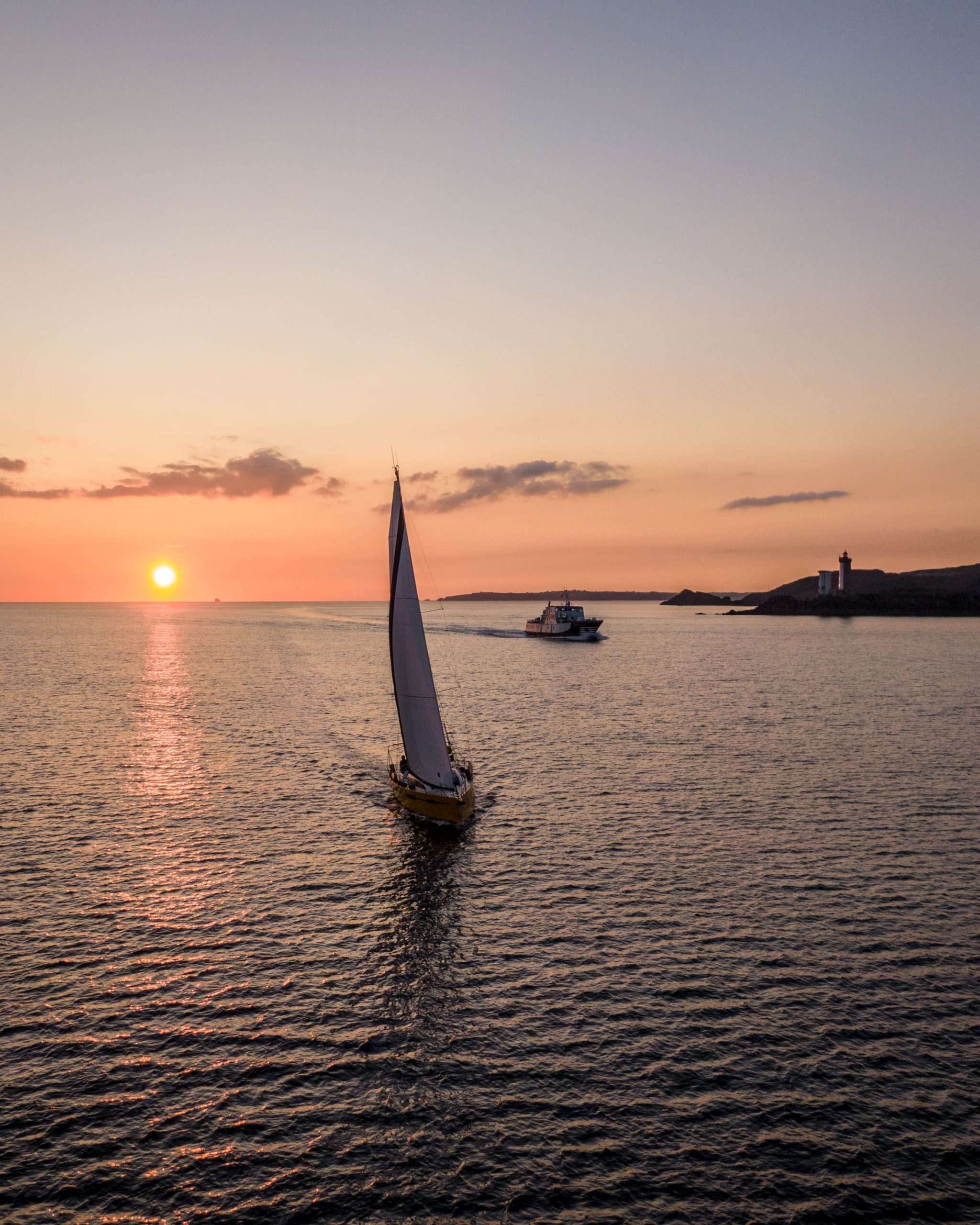
La Compagnie Marine: the beginning of a revolution in maritime transport
This article was written with the help of an interview with Alexandre Billot, co-founder of La Compagnie Marine, conducted by Maria Suciu, Head of Partnerships for Econogy Project.
By: Maria Suciu, Head of Partnerships for Econogy Project
Playing its part
Last year, at the peak of the COVID-19 crisis, La Compagnie Marine was born. The project took shape on the North-Eastern Coast of the United States following an assessment made by two Frenchmen about the impossibility of buying products both designed and transported in a 100% eco-friendly way. La Compagnie Marine seeks to fill this lack of supply by refurbishing former sailing racing boats and establishing a regular merchant transport line linking France to the United States. Not only does this mode of transport have a zero-carbon impact offer, but it also offers a responsible alternative to the polluting chaos of regular container ships. Additionally, it creates eco-friendly shipping jobs while allowing sailing enthusiasts to live from their passion.
La Compagnie Marine is not looking to compete with the maritime sector but is seeking to prove that an alternative to the traditional transportation method is possible. La Compagnie Marine wants to make a fundamental change in several ways. First, it seeks to emphasize the impact of the transport sector on the environment, which the consumer tends to neglect even when buying eco-responsible products. Secondly, it questions the absolute necessity of short delivery periods. Finally, it hopes to play its part in order to eventually grow and have an activity capable of revolutionizing the world of transport.
With this, there are multiple questions that arise. Despite the rise of the greenwashing fear, how does La Compagnie Marine intend to multiply its partnerships? How does it manage to be profitable and compete with the more conventional modes of transport?
The company began by tackling the luxury industry. Given the fact that these companies place brand image at the center of their businesses, at first glance it seemed they could be very interested in the alternative presented by La Compagnie Marine. Offering products with very high added value, these companies could afford the sometimes-greater expenses generated by the sailing transport. However, companies are also aware of the fact that customers may interpret this new means of transport as purely a marketing strategy.
Strategic marketing move and fears of greenwashing accusations?
In recent years, we have observed the adoption of eco-responsible policies by many companies, be them luxury brands or not (Platania, Santisi, Morando, 2019). However, some researchers are afraid that these climate-friendly company policies are disguised marketing strategies. In the worst cases, these are words without deeds, otherwise known as greenwashing.
Greenwashing is increasingly known and pointed out. By preaching an eco-responsible discourse, polluting companies seek to remove a weight off of their customer’s shoulders in order to attract and maintain the most clients. There have been many movements aiming to end greenwashing practices. One of the most well-known is that of Amis de la Terre and their Prix Pinnochio, a yearly “award” given to a ‘greenwashing winner’. The Prix Pinnochio is an original way of alerting the customer which, hopefully, leads to cessation and diminishment of consumer ties with the winning companies.
Nevertheless, the condemnation of greenwashing has actually had a pernicious effect. Large companies have started proceeding with extreme caution, and some have even ended up adopting a counterproductive approach when it comes to making eco-responsible decisions. As explained by a consultant from the Relations d’Utilité Publique Agency (RUP): “any communication is an act of commitment” (LCI, 2020). Companies avoid implementing too much action in this domain out of fear of being accused of greenwashing. Ultimately, the steps taken towards a green shift are often laborious.
La Compagnie Marine has had to deal with the obstacle of greenwashing fears before managing to partner with major brands in the European luxury industry. However, it has been helpful that the youth have been strong advocates for sustainable development objectives, as, in turn, it has led companies to believe that non-action in this field would lead them to lose this consumer demographic. Companies are therefore sailing between willingness to act, realism and fear.
La Compagnie Marine’s strategic choice of wanting to partner with the big luxury firms could pay off in the long run as it could cause a top-down revolt. We can start to believe that if the giants of the luxury industry started using a responsible transport alternative, other companies will follow them in their approach. Thus, this allows initiatives like La Compagnie Marine to flourish.
Difference in perception and reaction in France vs United States
The Compagnie Marine has also found itself faced with a dichotomy in the perception and reaction of the French, on the one hand, and the Americans on the other. In France, President Emmanuel Macron perfectly summed up the European climatic dynamic, as for him, it is the “fight of the century” (Elysée, n.d.). The European Union has adopted a similar rhetoric and repertoire of actions by making the Green Deal a top priority for the 2019-2024 period (European Commission, n.d.).
On the other side of the Atlantic, the United States seems to be lagging behind, even if we have recently noticed a strong political will to catch up (Biden, n.d.). In 2017, only 55% of US citizens considered sustainable development to be of major importance (Pew Research Center, 2017), while, in France, only 7% of the population was skeptical of climate change (IPSOS, 2015). In addition, 8 out of 10 French people want companies to face economic penalties in order to offset their negative environmental impact (Le courrier de l’Atlas, 2020).
There is also a polarity in the American relationship between environmental protection and sustainable development, a polarity that La Compagnie Marine has dealt with. Mr. Billot, co-founder of the company, mentioned that the reaction of urban American buyers of products transported by La Compagnie Marine can be compared to that of Europeans. They are ready to take the plunge by engaging in a greener and more sustainable trade. Rural consumers, on the other hand, are not yet as sensitive to these green initiatives. He explains that this skepticism translates into the pragmatism of companies, as they do not engage in climate-friendly trade without expecting economic returns. This only fuels a vicious circle as most companies do not offer green approaches that could help raise awareness to a larger part of the population.
The positive feedback received by La Compagnie Marine in France and the United States are a guarantee of a real growing interest. In the long term, this can be transformed into a revolution in the world of logistics and transportation. To achieve concrete change, it is now up to customers and companies to develop a real sustainable consciousness, and to realize what truly lies behind the scenes of the next day delivery.
Sources
Interview with Alexandre Billot (21/09/2021)
Atwal G., Bryson D. (2017) Responsible Luxury. In: Luxury Brands in China and India. Palgrave Macmillan, London. https://doi.org/10.1057/978-1-137-54715-6_8
Chen, YS. The Drivers of Green Brand Equity: Green Brand Image, Green Satisfaction, and Green Trust. J Bus Ethics 93, 307–319 (2010). https://doi.org/10.1007/s10551-009-0223-9
Davies, I.A., Lee, Z. & Ahonkhai, I. Do Consumers Care About Ethical-Luxury?. J Bus Ethics 106, 37–51 (2012). https://doi.org/10.1007/s10551-011-1071-y
Platania, S., Santisi, G., & Morando, M. (2019). Impact of emotion in the choice of eco-luxury brands: The multiple mediation role of the brand love and the brand trust. Calitatea, 20(S2), 501-506.
https://www.amisdelaterre.org/campagne/prix-pinocchio/
https://ec.europa.eu/info/strategy/priorities-2019-2024/european-green-deal_en
https://joebiden.com/clean-energy/
https://www.ipsos.com/fr-fr/les-francais-face-au-changement-climatique





Leave a Reply